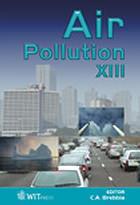|
Literature / Source Database:
Advances in Air Pollution
| Title (short) |
Adv. Air Poll. |
| Languages |
English |
|
|

|
Status
active
Subject

Source type
Book Series
Publisher
ISBN ISSN
1369-5886
First volume
1
Last volume
15+
Publish city
Ashurst Lodge
Homepage
| Resources |
|
Availability |
|
|
|
|
|
| Text PDF |
 |
free access |
 |
| Text Html |
 |
for subscriber |
 |
| References |
 |
not available |
 |
| Abstracts |
 |
|
|
| TOC |
 |
|
|
|
|
|
|

Description
The last decade has shown an increase in public and government concern around environmental issues due to air pollution, in particular that generated by man-made processes associated with the lifestyle of modern society.
Atmospheric pollution consists of the adverse effects of a variety of contaminants emitted into the atmosphere by natural and man-made processes. These phenomena are complicated because an apparently inert contaminant can be transformed by chemical reaction into an adverse one, during its transport through the atmosphere.
Nowadays, the physical and chemical processes undertaken during an air pollution episode are to a large extent understood. The modelling of such processes has shown a constant and remarkable growth in the last three decades. Also, the development of efficient and economical monitoring devices has been very successful in recent years. Modelling and monitoring studies constitute only an initial activity. The results provide useful information for possible future implementation of emission regulations and control strategies.
The definition of efficient control strategies cannot be achieved without a good and clear knowledge of the complete pollution process, i.e. emission, transport and transformation. Pollution is widespread throughout the world and elimination of the risks to human health is of paramount importance.
Volumes in the series cover areas of current interest or active research in air pollution and include contributions by leaders in the field. Topics for the series include: air pollution assessment, management, monitoring and modelling; aerosols and particles; chemical transformation modelling; chemistry of air pollution; comparison of modelling with experiment; data analysis and observation; emission inventories; fluid mechanics for air pollution; global studies; health problems; indoor air pollution; laboratory studies; process studies; regulatory bodies; turbulence modelling at small and meso scales; urban air pollution, and urban and suburban transport emission.
|